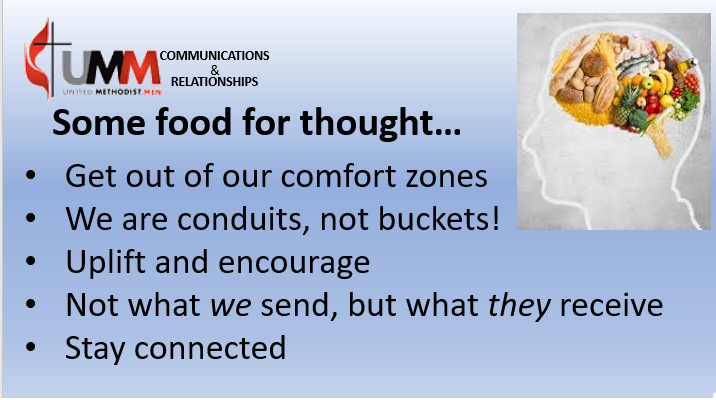THE ROLE OF COMMUNICATION
Introduction
Not coincidentally, this month’s presentation dealt with communications and relationships. This presentation was originally given by SEJ President Andrew Kissell and me at March’s NACP meeting.
The goal of this discussion was to reaffirm the role of communication in making connections and building relationships, what are the keys to effective communication, and some of the pitfalls.
The importance of communication
As Christians we know that building relationships with God and each other are part of a growing discipleship. It’s not always easy, in fact often it can be very uncomfortable, but getting to know and understand each other is essential to building a relationship.
Successful relationships and effective communications go hand in hand. We make ourselves vulnerable by being more open, but doing so breaks down barriers to understanding. To be effective communicators, we have to take risks. As Christians, sometimes we have to stand up and speak up and be the reflected light of Jesus in the world and enhance the experiences of abundant life and faith, of joy and peace, and of Grace- we are the salt of the earth. It’s what makes us relevant and not bland!
Doing right
When you know what you are doing is right it is easier to be bold. It is righteous to speak up for the oppressed, for minorities and foreigners, for what is right & what is just. There are several reasons why we aren’t always successful in communicating; we will touch on most of them here.
We are meant to help information flow; not keep it for ourselves. In healthy relationships, information is shared, not withheld. Information is a tool, not a weapon.
Words have power; use them wisely. James 3 warns us about taming the tongue while the Sermon on the Mount (Matt 5:22) promises consequences when the intentions of our heart pour out in anger, when we are contemptuous, or condemning of others without cause. Racism is a good example of unfounded anger often including elements of shame, paranoia, defensiveness and frustration.

The power of understanding
We cannot assume that everyone shares our understanding. The message is not what you send; the message is what they receive.
Remember, there are numerous ways to stay connected. We don’t want to risk losing trust and connections by failing to maintain communication. And sometimes, the old ways, like phone calls, are the best ways.
As we’ve already mentioned, as leaders we need to speak up and speak out. As Yoda said, “Do or not do; there is no try.” Rick Warren said “I would rather attempt to do something great and fail then to do nothing and succeed.”
To be a good communicator we must be good listeners. Be an active listener. Ask clarifying questions.
“Seek first to understand, then to be understood.”
– Stephen Covey, Seven Habits of Highly Effective People
Being too goal focused can hurt relationships.
“Relationships are more important than ambition.”
– Emily Esfahani Smith
The depth of a relationship is proportional to the level of conflict we’re willing to risk. We need to overcome our fears because without understanding we cannot reconcile.
“This is my commandment: that you love one another as I have loved you.”
John 15:12 (ISV)

What it Christlike love looks like...
So, what does loving one another as God loves us look like? While it can take many forms, it often requires that we have to be bold–we have to stand up and speak out.
Loving one another requires that we uplift and encourage each other. Why? So we may abide in Christ. We do so by reinforcing good behavior, not simply criticizing bad. Think of Paul’s letters: lots of compliments first, then constructive criticism.
On rare occasions we may have to confront someone in our organization. We will frequently have to hold each other accountable. Whether you are talking in person or over the phone, or talking face-to-face or on Zoom, there are things that you need to consider before delivering your well-intended message.
Words are like bullets… they travel far and can do real damage. For emails and social media posts, the lack of social cues—facial gestures, vocal intonations, body language—can result in people erroneously “filling in the blanks” as to your meaning.
In addition to proper understanding, timeliness is also important. In this day and age, phone calls may seem old fashioned. But they can get the point across with more clarity and detail… and a lot sooner. Time is also a factor in other ways. Expecting immediate responses and delaying providing critical information can both have adverse effects. Think ahead who gets included or copied.
In conclusion
Finally, responsibility for communication and relationship is a two-way street. Be ready and willing to give the benefit of the doubt to the receiver. “Did I make myself clear?” “Did I ask affirming questions or paraphrase to ensure I understood?
Good communications are the responsibility of both the speaker and the listener. Keep an open mind—and often, a closed mouth. Work on being a better listener. Develop the habit of asking questions that provide you with better understanding or greater detail. And if you don’t feel comfortable speaking out in situations, asking good questions is a good way to start, maintain, and contribute to communication.
